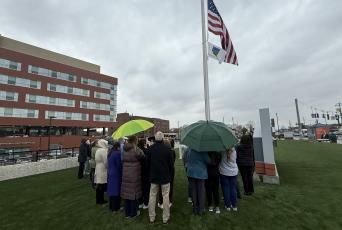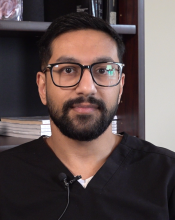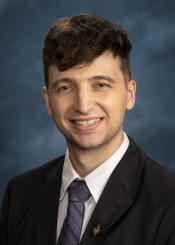
Gastroenterology
Screening and Early Detection Key to Effective Treatment
Any day is a good time to learn more about colorectal cancer (cancer of the colon and rectum) and how it can be prevented or best treated. Colorectal cancer is the second leading cause of cancer-related deaths in the United States for both men and women combined. This year, approximately 140,000 new cases of colorectal cancer will be diagnosed and 56,000 people will die from the disease. But colorectal cancer is a disease that can be prevented through regular screenings, a healthy diet and regular exercise.
Why Colorectal Cancer Screening Works
Many people have growths in their colon called polyps. While these are often not cancerous, certain types of polyps can become cancerous over time. Finding and removing them during a screening colonoscopy not only allows the doctor to test for early signs of cancer; it removes potential sources of cancer. For this reason, you should not wait to have a colorectal cancer screening.
For people at average risk, screening should begin at age 45. Screenings are generally repeated every 10 years unless results from the colonoscopy suggest a higher risk for cancer.
Family history and other health considerations may increase your personal risk of colorectal cancer and require a unique screening schedule. For example, if a close blood relative had colorectal cancer, screening should begin 10 years before the age at which your relative was diagnosed, and repeated more frequently. It’s important to discuss personal risk factors with your doctor.
Screening may also be recommended if you experience symptoms of colorectal cancer at any age, including rectal bleeding, a change in bowel habits, or abdominal pain or weight loss of unclear cause.
The Colonoscopy Procedure
Colonoscopy is an outpatient procedure. Patients fast and drink a laxative liquid to clear out the colon the evening before the test is scheduled. Once patients arrive at the screening clinic the next day, they are sedated, which allows them to relax or sleep during the procedure. The doctor then threads a thin scope outfitted with a tiny video camera into the colon and watches the video images on a screen, looking for polyps and other signs of disease. Polyps are removed for prevention during the procedure, and once removed are tested for cancer.
The appointment will typically take between three to four hours from arrival to departure, and most patients do not feel any pain or remember the procedure afterwards. In fact, it is commonly observed that the most uncomfortable part of colorectal screening is drinking the prep solution the day before. Fortunately, patients now have the option to choose from a variety of newly available solutions that are more comfortable to drink than the traditional options.
Gastroenterology Services
Our New York gastroenterology services at UHS Gastroenterology deliver excellent diagnosis and treatment of diseases affecting the digestive tract.
What is a Gastroenterologist?
A gastroenterologist is a physician who specializes in diseases and disorders of the digestive system—the esophagus, stomach, colon, liver and pancreas. A pediatric gastroenterologist focuses on these issues as they affect children (newborns through teens). The gastroenterologists on staff at UHS Hospitals combine expert clinical care with the latest medical technologies in caring for patients.
Some of the many conditions gastroenterologists treat include:
- Cancers of the digestive tract, particularly colon cancer
- Chronic abdominal pain
- Chronic constipation
- Chronic diarrheal disorders
- Crohn’s disease
- Gastro-esophageal reflux disease
- Liver and biliary diseases
- Peptic ulcer disease
- Swallowing disorders
- Ulcerative colitis
UHS Gastroenterology Laboratories
Your gastroenterologist or other physician may prescribe a procedure or test that requires you to visit one of UHS’ two gastroenterology laboratories—at UHS Binghamton General Hospital and UHS Wilson Medical Center. The UHS Binghamton General Hospital GI Lab is the where most outpatient procedures, such as colonoscopies and gastroscopies, are performed; but each lab provides excellent care delivered by a qualified and friendly staff.
If you have questions regarding your procedure (for example, if you should take your medication before your procedure or what else you need to do to prepare for the test) please discuss these with the physician who is ordering your procedure. However, our staff will be happy to provide information to you throughout your exam so you understand what is taking place.
UHS Binghamton General Hospital GI Lab
- Located on the second floor of the hospital
- Open Monday through Friday at 7:00am
- Binghamton, NY
607-762-2276
UHS Wilson Memorial Medical Center GI Lab
- Located on the first floor of the hospital
- Open Monday through Friday at 7:00am
- Johnson City, NY
607-763-6032
UHS Chenango Memorial Hospital GI Lab
UHS Chenango Memorial Hospital and UHS Gastroenterology work together at UHS Chenango Memorial Hospital and offer colonoscopy and other common outpatient screenings and therapies for gastrointestinal disorders.
These UHS Gastroenterology physicians have extensive expertise in cancer screening, cancer prevention and in treating diseases that increase cancer risk.
These experience provider deal with cases of:
- Crohn’s disease
- Gallstones
- Hiatal hernia
- Heartburn
- Pancreatitis
- Abdominal pain
- Diarrhea/constipation
- Diverticulosis and diverticulitis
- Gastroesophageal reflux disease (GERD)
- Lactose intolerance
- Swallowing disorders
- Ulcerative colitis
- Ulcers of the stomach and duodenum
- Irritable bowel syndrome
The GI department is located on the 4th floor at UHS Chenango Memorial Hospital.
To schedule an appointment, call UHS Gastroenterology Norwich at 607-337-4970.
UHS Delaware Valley Hospital GI Lab
At UHS Delaware Valley Hospital, endoscopy and colonoscopy consultations are offered by our visiting specialist, Dr. Amanke Oranu.
Please call UHS Primary Care - Walton to schedule an appointment.
607-865-2400
UHS News
-
 Know where to go for your medical concernApril 14, 2025
Know where to go for your medical concernApril 14, 2025It can be tough to distinguish where to go for medical care when your symptoms feel unbearable, and your primary care provider is unavailable. Here are some key differences to help you decide.
-
 Guided by instinct, healed by expertise — orthopedic care close to homeApril 14, 2025
Guided by instinct, healed by expertise — orthopedic care close to homeApril 14, 2025Ever since she was a little girl, Kaylee Goodspeed has been involved in cheerleading. However, as she grew older, she started developing issues with her knees that, if not cared for properly, could have caused problems in the future. With her mother’s advocacy and an expert team of UHS Orthopedic surgeons, Kaylee is now cheering, tumbling and living a normal life once again.
-
 Flag-raising held to commemorate Donate Life MonthApril 10, 2025
Flag-raising held to commemorate Donate Life MonthApril 10, 2025UHS held a flag-raising ceremony at UHS Wilson Medical Center on April 10 to commemorate National Donate Life Month, a celebration of those who have given the gift of life through organ, eye and tissue donation.
-
 Empty Bowls event raises over $8,000 to support hunger reliefApril 10, 2025
Empty Bowls event raises over $8,000 to support hunger reliefApril 10, 2025A huge THANK YOU to everyone who attended the 2025 Empty Bowl Events and showed their support for hunger relief in our area. or every ticket sold, the Food Bank provides 75 meals to the hungry in the Southern Tier!
















